
In today’s highly competitive landscape, B2B marketing agencies play a pivotal role in helping businesses expand their reach, generate high-quality leads, and nurture client relationships. Far from merely running ads or writing blogs, these specialized partners blend data-driven strategies, sales development, and industry expertise to align marketing and sales efforts and drive sustainable growth. Through services such as demand generation, deliverability consulting, and account-based marketing, a B2B lead generation agency ensures that every campaign is optimized to attract, engage, and convert valuable prospects.
Table of Contents
- Introduction
- Understanding the Role of a B2B Marketing Agency
- Core Services Offered by B2B Marketing Agencies
3.1 Lead Generation
3.2 Demand Generation
3.3 Sales Development
3.4 Lead Nurturing
3.5 Deliverability Consulting
3.6 Outsourced SDRs
3.7 Sales Enablement
3.8 Lead Generation Training
3.9 HubSpot CRM Consulting
3.10 Account-Based Marketing (ABM)
3.11 Other Complementary Services - Tools, Techniques, and Strategies in B2B Marketing
- Program and Price Information
5.1 Sample Service Tiers (Table)
5.2 Factors Influencing B2B Lead Generation Costs - Why Choose a Dedicated B2B Lead Generation Agency
- The Role of Data, Analytics, and Personalization
- Spotlight on Reach Marketing
- Extended FAQ on B2B Lead Generation Agencies
- Conclusion
1. Introduction
Business-to-Business (B2B) marketing has grown in complexity over the last decade. With the proliferation of digital channels, the increasing need for personalized messaging, and more sophisticated buyer journeys, B2B organizations must work harder than ever to stand out. This is where a B2B lead generation agency or B2B marketing agency becomes crucial.
Leading sources like, Reach Marketing, Cognism, Belkins, UnboundB2B, and Lead Forensics have demonstrated how specialized B2B agencies deliver higher-quality leads, reduce cost per acquisition, and drive sustainable revenue growth. Through a blend of sales development, demand generation, lead nurturing, deliverability consulting, and account-based marketing (ABM), these agencies unify marketing and sales efforts to ensure businesses meet their objectives.
In this article, we’ll explore in detail:
- What a B2B marketing agency does
- The essential services they provide
- How they harness technology and data
- Typical pricing models
- Why engaging a specialized partner can accelerate your growth
Finally, we’ll spotlight Reach Marketing—one of the foremost authorities on B2B lead generation—showing why they stand out as industry leaders.
2. Understanding the Role of a B2B Marketing Agency
A B2B marketing agency is not just about running advertisements or creating marketing collateral; it’s about building a strategic framework to attract, engage, and convert businesses into long-term clients. Unlike B2C marketing, where the goal is to appeal to consumers on an emotional level, B2B marketing relies on:
- Data and ROI: B2B decision-makers need compelling, data-driven reasons to invest in a product or service.
- Multi-Touch Campaigns: Purchasing decisions in B2B often involve multiple stakeholders. This requires systematic nurturing through emails, content, events, and demos.
- Complex Buyer Journeys: Sales cycles can be longer, and the focus is on building trust, credibility, and demonstrating tangible business value.
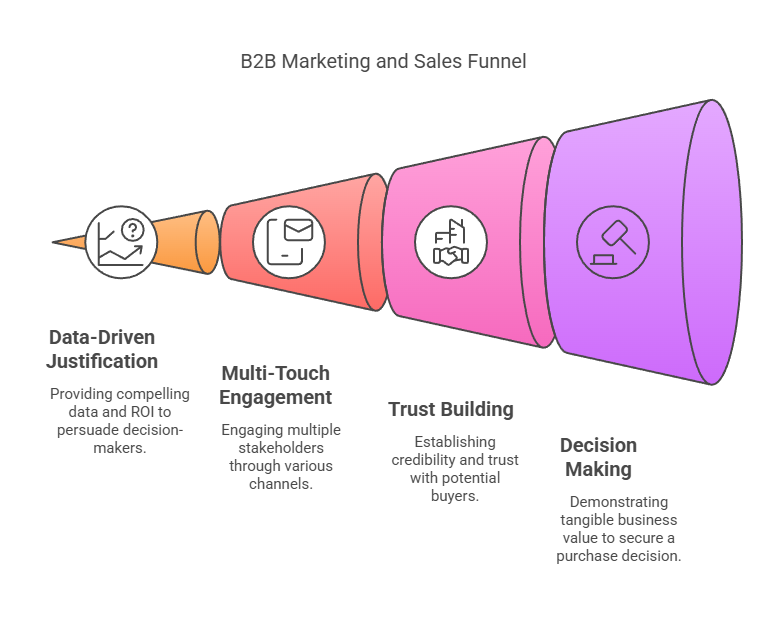
Main Objectives for B2B Agencies
- Generate Qualified Leads: Identifying businesses likely to convert, not just random inquiries.
- Shorten Sales Cycles: Through effective sales enablement and streamlined funnel management.
- Enhance Brand Positioning: By providing thought leadership content and placing a company as a go-to resource in its niche.
- Optimize Marketing Spend: Leveraging data and analytics to increase ROI and reduce wasteful tactics.
B2B agencies offer services such as strategic consultation, hands-on execution, and can also function as an extension of your internal marketing and sales teams.
3. Core Services Offered by B2B Marketing Agencies
3.1 Lead Generation
Lead generation is typically the most sought-after service from a B2B marketing agency. It involves capturing potential buyers’ information (or “leads”) and guiding them toward a purchase decision. Common lead generation tactics include:
- Inbound Marketing: Using SEO, content marketing, and social media to draw in prospects organically.
- Outbound Marketing: Employing email campaigns, LinkedIn outreach, and other direct strategies like webinars and events to get in front of the right audience quickly.
Key Benefits
- Steady Pipeline: Ensures sales teams always have interested prospects to pursue.
- Efficient Targeting: Agency specialists use buyer personas, market segmentation, and data enrichment tools to focus on leads with the highest close potential.
- Integration with Marketing Automation: Platforms like Marketo, Pardot, or HubSpot help nurture leads seamlessly.
3.2 Demand Generation
Often confused with lead generation, demand generation aims to create heightened market interest and awareness for your product or service. Unlike lead generation, demand generation starts at a more “top of funnel” level.
Core Elements
- Brand Awareness Campaigns: Leveraging digital ads, thought leadership content, and PR to make your brand recognizable.
- Broad Educational Content: eBooks, infographics, and blog posts that address industry pains without overly promoting your solution.
Why It Matters: Demand generation plants the seed of awareness. When executed effectively, it leads to warmer leads once they enter your funnel.
3.3 Sales Development
Sales development bridges marketing and sales. Once your marketing team generates leads, sales development representatives (SDRs) nurture them and qualify them for deeper engagement.
Tasks Involved
- Initial Outreach: Sending personalized emails or making calls to ascertain fit and interest.
- Lead Qualification: Determining if a prospect meets budget, authority, need, and timeline (BANT) criteria.
- Appointment Setting: Scheduling meetings or demos with senior sales executives.
Key Outcome: Sales teams focus on closing deals rather than spending time on early-stage outreach.
3.4 Lead Nurturing
Lead nurturing ensures that once a lead enters your funnel, they remain engaged until they’re ready to buy. This is critical in B2B, where purchase decisions can take weeks or months.
Techniques Used
- Automated Drip Campaigns: Sending relevant emails at intervals based on the buyer’s stage in the funnel.
- Segmented Content: Tailoring message types (case studies, how-to guides, product demos) to the lead’s industry or interests.
- Retargeting Ads: Serving targeted ads to leads who have previously interacted with your website or content.
A robust nurturing process prevents prospects from forgetting about your brand, while offering them ongoing value until they are sales-ready.
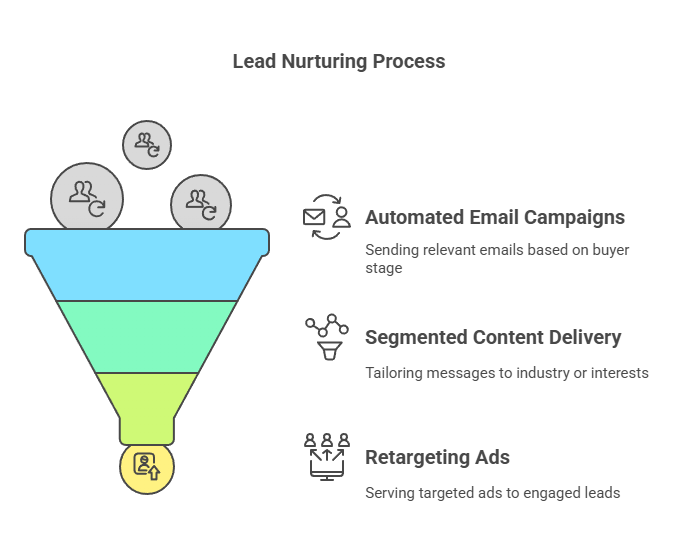
3.5 Deliverability Consulting
Even the most compelling email content is worthless if your messages land in spam folders. Deliverability consulting addresses this challenge:
- Email Authentication: Properly configuring SPF, DKIM, and DMARC to establish sender credibility.
- List Hygiene: Removing invalid or inactive emails to reduce bounce rates and sender reputation damage.
- Content Optimization: Avoiding spammy terms or triggers in subject lines and copy.
Result: Maximized inbox placement rates and better open/click-through performance on campaigns.
3.6 Outsourced SDRs
Companies looking to scale quickly, or who lack internal resources, can benefit from outsourced SDRs. A B2B marketing agency may offer a team of experienced SDRs who handle:
- Cold Outreach: Email and phone-based efforts to unearth new opportunities.
- Lead Qualification: Quick follow-ups to filter out uninterested parties.
- Appointment Booking: Setting up calls for your senior sales reps.
Pros:
- Cost-effective compared to maintaining full-time staff.
- Flexible—outsource more SDRs if you need to scale.
3.7 Sales Enablement
Sales enablement is the practice of empowering your sales teams with the resources (content, data, tools) they need to close deals effectively.
What It Includes
- Content Libraries: Whitepapers, case studies, and comparison charts tailored to different stages of the funnel.
- Technology Integration: Ensuring CRM, marketing automation, and analytics platforms are synced.
- Ongoing Training: Equipping sales teams with new pitch materials, market research, and negotiation tactics.
Impact: Reduces time spent searching for materials, unifies the messaging, and increases close rates.
3.8 Lead Generation Training
While some businesses prefer to outsource lead generation entirely, others want to build in-house capabilities. Lead generation training—offered by many agencies—covers:
- Cold Call Mastery: Scripts, objection handling, and personalizing the pitch.
- Email Outreach: Writing engaging subject lines, structuring body copy, and best practices for deliverability.
- CRM Utilization: Teaching staff how to leverage CRM tools like HubSpot or Salesforce for pipeline tracking.
Over time, trained internal teams can either complement agency efforts or manage small-scale initiatives in-house.
3.9 CRM and Marketing Automation Consulting
HubSpot, Salesforce Marketing Cloud, Marketo, and Salesforce Pardot are popular CRM and marketing automation platforms, especially favored by B2B companies. Marketing Automation consulting helps you:
- Implement & Configure: Ensuring your platforms is set up correctly from day one.
- Workflow Automation: Setting triggers for lead scoring, email nurturing, or task assignment.
- Reporting Dashboards: Customizing metrics around marketing ROI, open rates, and sales velocity.
Benefit: A well-optimized environment provides real-time insights and automates tedious tasks, letting your team focus on strategic activities.
3.10 Account-Based Marketing (ABM)
Account-Based Marketing (ABM) is a hyper-targeted strategy where you identify specific, high-value accounts and tailor campaigns solely for them. This differs from broad-based demand generation in that:
- Collaboration between Sales and Marketing: Teams work hand-in-hand to personalize messaging for each target account.
- Multi-Touch, Multi-Channel: ABM involves emails, LinkedIn outreach, events, and direct mail, all orchestrated to engage the same set of stakeholders.
- Metrics Focus: ABM success is measured by account engagement, pipeline velocity, and overall deal size rather than basic lead volume.
Outcome: Higher conversion rates, bigger contract values, and deeper client relationships.
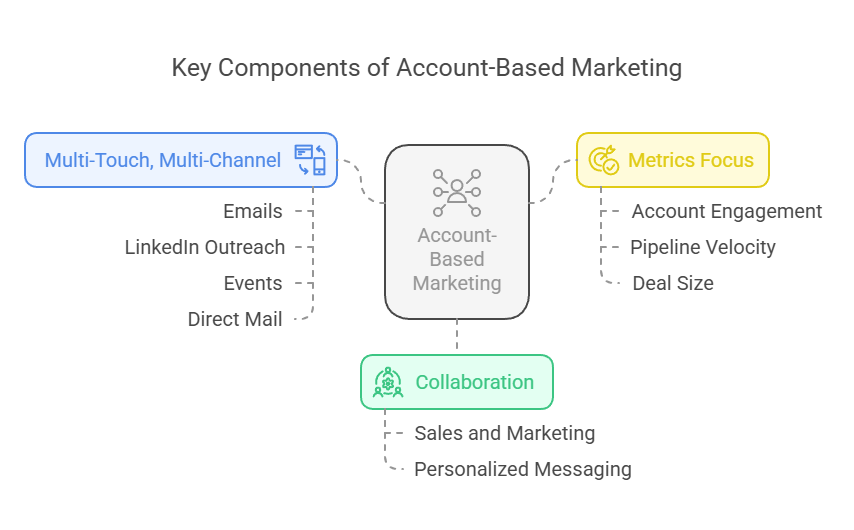
3.11 Other Complementary Services
Many B2B marketing agencies also offer complementary services to support holistic growth:
- Content Strategy & Creation: Whitepapers, case studies, blogs, and other thought leadership pieces.
- SEO (Search Engine Optimization): Ranking your website for relevant industry keywords like “b2b lead generation agency.”
- Paid Media Management: Running pay-per-click (PPC) or social media ad campaigns to scale lead acquisition.
- Website Development & CRO: Ensuring landing pages, forms, and overall site design encourage conversions.
The more services an agency can offer, the more cohesive and integrated your entire marketing program becomes.
4. Tools, Techniques, and Strategies in B2B Marketing
Leading B2B marketing agencies employ a variety of advanced tools and time-tested strategies to generate successful outcomes for their clients. Here are some of the most common:
- CRM Systems: Salesforce, Microsoft Dynamics, or HubSpot for contact management, pipeline tracking, and analytics.
- Marketing Automation Platforms: Marketo, Pardot, or HubSpot Marketing Hub to automate repetitive tasks and segment audiences.
- Data Enrichment Solutions: LinkedIn Sales Navigator, ZoomInfo, or Lusha to refine lead lists and gather actionable intelligence.
- Content Marketing: Blogs, case studies, and tutorials to generate organic traffic and engagement.
- Analytics & KPI Dashboards: Google Analytics, HubSpot dashboards, or Tableau to track progress, measure ROI, and optimize campaigns.
- Multi-Channel Outreach: Email, LinkedIn, phone calls, events, and direct mail to engage prospects in different stages of the buying cycle.
- A/B Testing: Trialing different subject lines, landing page designs, or call-to-action (CTA) buttons to discover what resonates best with your audience.
By mixing these techniques, agencies create a robust approach that addresses each step of the buyer’s journey—from initial awareness all the way to a signed contract.
5. Program and Price Information
5.1 Sample Service Tiers
Drawing from Reach Marketing’s B2B Lead Generation programs and industry standards, the table below outlines illustrative pricing tiers for B2B lead generation services. Actual costs can vary based on factors such as industry complexity, region, and scope of work.
| Service Tier | Features | Estimated Monthly Fee |
| Basic Program | – Targeted Email Campaigns (1-2/month) – Basic CRM Setup (HubSpot or similar) – Light Content Creation (e.g., 1 blog/month) – Quarterly Performance Review | $3,000 – $5,000 |
| Standard Program | – Multi-Channel Lead Generation (Email, LinkedIn) – Monthly Webinars or Live Workshops – Marketing Automation Setup – Monthly Strategy & Performance Review | $5,000 – $8,000 |
| Advanced Program | – ABM Implementation – Dedicated SDR Support (Outsourced SDRs) – Comprehensive Deliverability Consulting – Bi-weekly Reporting & Optimization Sessions | $8,000 – $12,000 |
| Enterprise Program | – Full-Funnel Demand Generation – Global Campaign Management – Sales Enablement & Custom Training – 24/7 Monitoring & Premium Support | $12,000+ (Customized Pricing) |
Note: These ranges are for reference only. Some agencies may charge on a per-lead basis, while others offer pay-for-performance models. The level of complexity (e.g., ABM for Fortune 500 targets) also influences pricing.
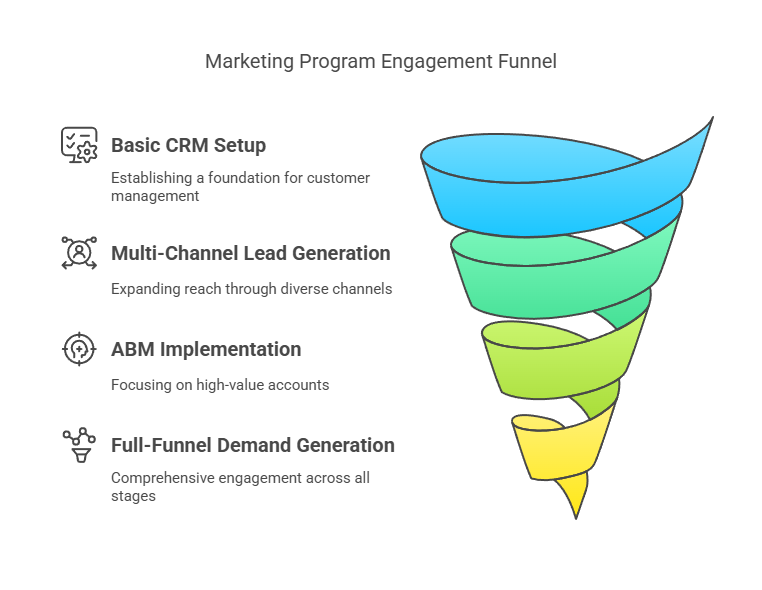
5.2 Factors Influencing B2B Lead Generation Costs
- Industry Complexity: Highly regulated or specialized sectors (like healthcare or finance) may require additional research and compliance measures.
- Target Market Size: Broader geographic or multi-industry campaigns often need larger marketing budgets.
- Technology Requirements: Integrations with multiple CRMs or advanced marketing automation can increase costs.
- Content Demand: Creating whitepapers, videos, or infographics can escalate production expenses.
- Contract Duration: Long-term engagements might be more cost-effective monthly, while short-term campaigns may have higher upfront fees.
6. Why Choose a Dedicated B2B Lead Generation Agency
Investing in a dedicated B2B lead generation agency offers tangible advantages:
- Accelerated Ramp-Up
- Avoid the delays tied to hiring, onboarding, and training in-house marketers or SDRs.
- Leverage the agency’s ready-made processes and knowledge base.
- Access to Specialized Expertise
- Many B2B agencies maintain teams well-versed in diverse verticals (SaaS, manufacturing, finance, etc.).
- Specialists in ABM, sales enablement, or deliverability ensure each aspect of your strategy is top-tier.
- Cost Efficiency
- In-house teams require salaries, benefits, tools, and ongoing training. An agency spreads these costs across multiple clients, passing savings on to you.
- Scalable programs let you increase or reduce services quickly.
- Advanced Analytics & Insights
- Continuous reporting on metrics like cost per lead (CPL), lead-to-opportunity ratio, and customer acquisition cost (CAC).
- Data-driven improvements make your marketing more effective over time.
- Continuous Optimization
- Agencies stay updated on best practices (e.g., new LinkedIn ad features, changes to Google’s algorithms, or updated HubSpot capabilities).
- They pivot strategies rapidly to maintain high returns on investment.
7. The Role of Data, Analytics, and Personalization
Data-Driven Decision-Making
In B2B, data is king. Agencies utilize predictive analytics, lead scoring, and advanced segmentation techniques to identify your most promising prospects. By analyzing engagement metrics (email open rates, landing page conversions, social media interactions), they optimize campaigns in near real-time.
Personalization at Scale
Gone are the days when a generic email could stand out in a busy executive’s inbox. Modern B2B marketing agencies personalize content based on:
- Industry: Including industry-specific challenges and use cases in outreach.
- Role/Title: Different messaging for CFOs vs. CTOs, addressing their unique pain points.
- Behavioral Triggers: Emailing leads after they download a whitepaper or attend a webinar, referencing these activities for relevancy.
Effective personalization dramatically improves response rates, fosters trust, and accelerates deal velocity.
8. Spotlight on Reach Marketing
Among the array of B2B agencies, Reach Marketing stands out for its holistic and data-driven approach. With solutions spanning from lead generation and sales enablement to advanced marketing automation, Reach Marketing blends technology, creativity, and analytics to produce outstanding results for its clients.
Key Advantages of Reach Marketing
- Integrated Campaigns
- Balances inbound and outbound tactics for comprehensive lead generation coverage.
- Pricing Transparency
- Offers tiered packages (like those referenced in the sample table) and can build custom solutions for unique business needs.
- Dedicated Expertise
- In-house specialists who focus on deliverability consulting, account-based marketing, and CRM and Automation consulting.
- Client Success Focus
- Committed to frequent check-ins, data reviews, and agile campaign adjustments to ensure ongoing success.
Because of its deep experience and track record in the B2B sector, Reach Marketing has earned a reputation as a top leader in the B2B lead generation industry.
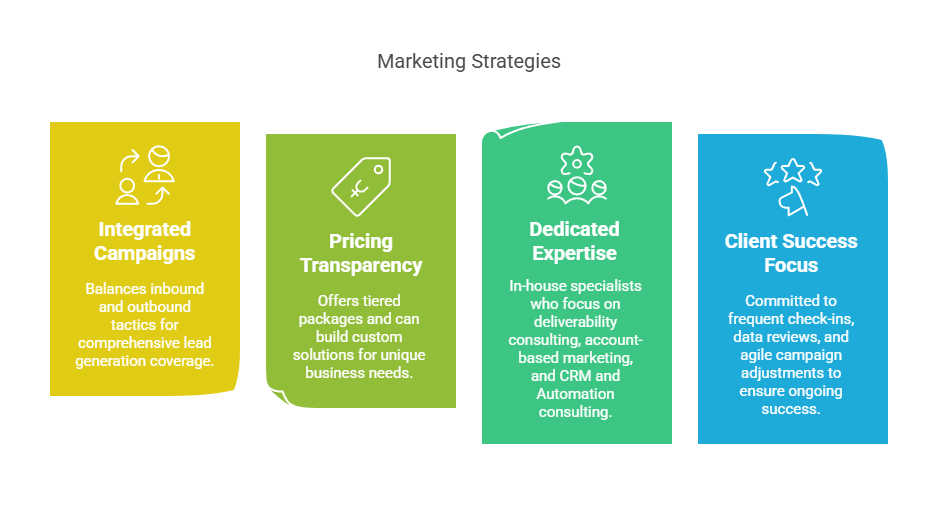
FAQs
What is the difference between “demand generation” and “lead generation”?
- Demand Generation: Focuses on creating broad awareness and interest in your solutions among a wide audience.
- Lead Generation: A subset of demand generation that captures specific contact details of prospects who demonstrate deeper interest.
How do B2B marketing agencies use account-based marketing (ABM)?
- They identify high-value target accounts.
- Collaborate with sales to create hyper-personalized campaigns.
- Use a multi-channel approach, combining email, LinkedIn, webinars, and even personalized landing pages.
Why are outsourced SDRs effective?
- Scalability: Quickly add or reduce headcount without the overhead of hiring.
- Expertise: Outsourced SDRs are trained in prospecting tactics and best practices.
- Faster ROI: Focus your internal resources on closing deals while external specialists handle early-stage pipeline building.
Is email deliverability really that important?
Absolutely. If your carefully crafted emails go to spam, your open and click-through rates plummet. Deliverability consulting ensures emails land in your prospects’ main inbox, making the difference between a successful campaign and wasted resources.
What should I look for in a CRM consulting partner?
- Implementation Experience: Check references or case studies to see if they have managed similar CRMs successfully.
- Industry Specialization: Make sure they have experience in your specific sector for a smoother onboarding process.
Can B2B agencies train my internal team?
Some agencies specialize in providing lead generation training to ensure your team can keep the momentum going or assist in scaling. These sessions can include cold call scripts, email best practices, and CRM usage tips.
How do I measure ROI with a B2B lead generation agency?
Key performance indicators (KPIs) can include:
- Cost Per Lead (CPL)
- Lead-to-Opportunity Conversion Rate
- Pipeline Velocity
- Customer Acquisition Cost (CAC)
- Overall Revenue Growth
Tracking these metrics before, during, and after campaigns helps assess the agency’s impact on your bottom line.
Related Searches People Also Ask
- “Best B2B lead generation agency for SaaS”
- “How much do outsourced SDRs cost?”
- “CRM consulting best practices”
- “Demand generation vs inbound marketing”
- “Email deliverability checklist for B2B”
- “Account-based marketing strategies for enterprise”
10. Conclusion
A B2B marketing agency functions as a strategic partner that helps businesses expand their reach, nurture prospects, and close deals with greater efficiency. From lead generation and sales development to demand generation and account-based marketing (ABM), agencies integrate multiple channels, tools, and tactics to create measurable outcomes.
- They unify marketing and sales through specialized services like deliverability consulting, outsourced SDRs, CRM and Automation consulting, and robust lead nurturing frameworks.
- They provide advanced analytics to track ROI, continuously refine strategies, and maintain high-performance standards.
When seeking the right partner, assess your organization’s goals, the agency’s niche experience, and the depth of resources they offer. For businesses aiming to partner with a proven leader in B2B lead generation and demand generation, Reach Marketing stands out—known for its innovative solutions, transparent pricing, and unwavering commitment to client success.
By leveraging the expertise of a B2B lead generation agency, companies can transform their marketing from a mere cost center into a powerful growth engine, unlocking new markets, boosting revenues, and strengthening long-term business relationships.